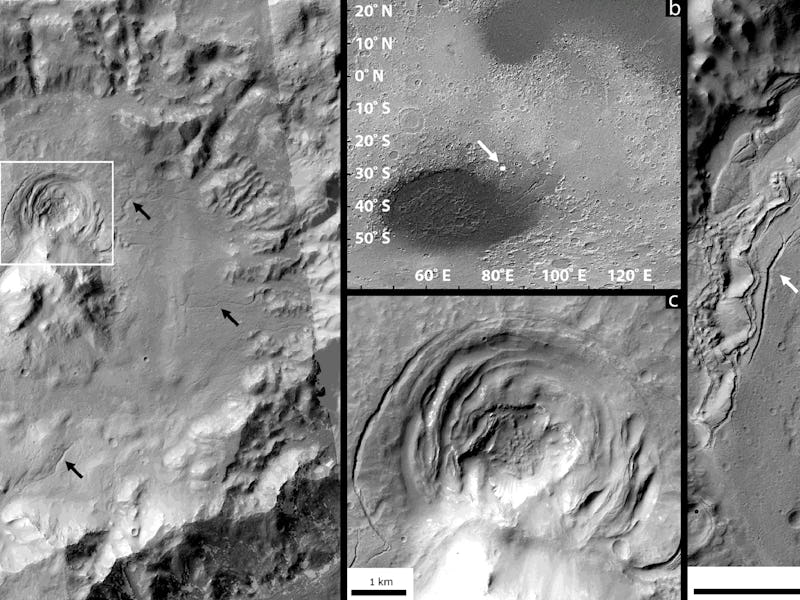Why the Internet Thinks This Martian Crater Might Host Aliens

New research on one of Mars’s volcanic depressions is striking quite the chord with readers and academics who believe in the possibility of life on the Red Planet. Similar to how hot, moist environments on Earth are breeding grounds for bacteria, the one-two punch of volcanic and glacial activity could mean a chemical-rich environment ripe for microbacterial life. That combination is what formed a crater on the rim of the Hellas depression, which (in addition to sounding like what the majority of us are suffering from in this post-election week) is possibly a good place to look for aliens.
The study, published in the journal Icarus, illustrates models the crater (discovered seven years ago) with high-res 3D imagery. Once scientists were able to take a better look, they noticed that the depression was rather “weird-looking,” and that the combination of ice and lava might have created exactly the kind of warm, wet, nutrient-rich ecosystem in which bacteria could thrive. The depression isn’t traditionally shaped, but instead developed a gentle gradient more resembling a funnel.
“That surprised us and led to a lot of thinking about whether it meant there was melting concentrated in the center that removed ice and allowed stuff to pour in from the sides,” said lead author Joseph Levy, a research associate at the University of Texas Institute for Geophysics, a research unit of the Jackson School of Geosciences, in a news release. “Or, if you had an impact crater, did you start with a much smaller crater in the past and by sublimating away ice, you’ve expanded the apparent size of the crater.”
Charting the depths of the Hellas basin crater (left) and the Galaxias Fossae crater (right).
Levy and his colleagues actually found a second, similar depression in Galaxias Fossae. Unlike the Hellas crater’s fire-and-ice origin story, this crater looks to be the result of an asteroid impact. The team are viewing both as potentially rewarding exploration targets.
The research was picked up in an RDMag story with the irresistible title “A New Search for Life on Mars,” after which point the internet proceeded to go a bit nuts, as it is wont with these kinds of stories. “Do Aliens Exist???” asked breathless follow-up pieces, as if one question mark alone would not be enough to convey the gravity of the situation.
The possibility of life on Mars has long been a tantalizing source of discussion — and, these days, of clicks — and people tend to react to any vaguely promising new information nugget with a whole lot of unchecked hype. This kind of rabid hypothesizing has only gotten louder since we discovered Mars does, in fact, have water. Our perpetual over-excitement about relatively tame studies of this kind is understandable; after all, aliens are cool. While we here at Inverse don’t necessarily relish the task of throwing cold water on readers, it’s important to keep a modicum of perspective about this stuff. These craters are cool, but they do not mean aliens exist.